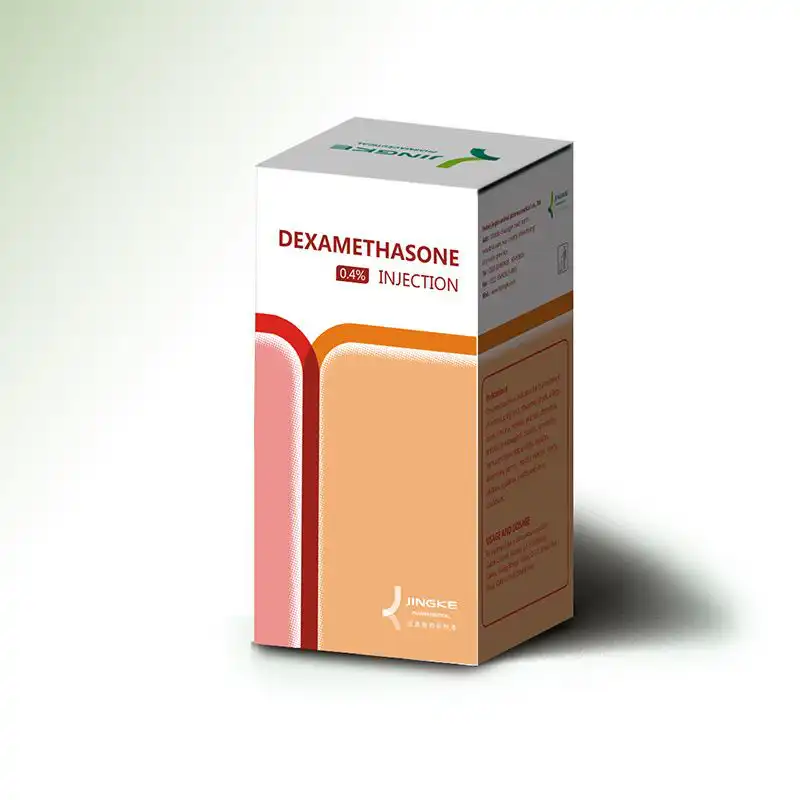Dexamethasone is a drug commonly used in pig farms. I believe everyone is familiar with this drug, but are you familiar with its principles and precautions?

1. Dexamethasone
Dexamethasone, also known as flumethasone, is a synthetic fluorinated long-acting glucocorticoid (also known as steroid hormone) commonly used in pig disease prevention and control. It can be converted into hydrocortisone in the liver. Dexamethasone belongs to the adrenal cortex hormone class of drugs, with anti-inflammatory, anti-allergic, anti-shock and anti-toxic effects. In addition, it has certain water and sodium retention and potassium excretion effects. It is mainly used in clinical treatment of severe bacterial infectious diseases, allergic diseases, shock, local inflammation and other comprehensive treatments.
2. Main effects of dexamethasone
1. Strong anti-inflammatory effect: It has an inhibitory effect on the inflammatory response process caused by bacterial, viral, fungal and other infections and other physical, chemical, immune and other factors. It can reduce and prevent inflammatory exudation, edema and inflammatory cell infiltration in the acute inflammatory period. It is effective in the acute stage of arthritis and rheumatism. It also has a good effect on postpartum infection, lochia, fever, loss of appetite and other antibiotics. It also has a good anti-inflammatory effect in the treatment of sow mastitis, but the dosage must be controlled. Excessive use will lead to a decrease in milk production.
2. Immunosuppressive effect: Immunosuppressive effect can be used to treat allergic diseases and shock, but it is prohibited during vaccination. It is effective for autoimmune diseases and blood diseases such as piglet hemolytic anemia and dermatitis-nephrotic syndrome.
3. Anti-toxin effect: Dexamethasone can maintain the integrity of cell membranes and reduce the permeability of cell membranes, making it difficult for endotoxins to penetrate into cells, improving the body’s ability to respond to harmful stimuli, reducing the damage of toxins to the body, relieving toxemia, and having a good antipyretic effect on the high fever of toxemia.
4. Anti-shock effect: It can improve the ability of blood vessels, strengthen myocardial contractility, increase blood output, and restore blood pressure, which is conducive to the correction of infectious shock, endotoxin shock, hypovolemic shock, cardiogenic shock, etc., and is used for the rescue of critical cases.
5. Anti-allergic effect: It can reduce the production and release of allergic mediators, so it can reduce the symptoms of allergic reactions (hypersensitivity reactions), such as allergies, urticaria, atopic dermatitis, etc. caused by vaccine injection.
Swine disease medication | Please keep in mind the contraindications and precautions for the use of dexamethasone!
3. Principles for prohibiting the use of dexamethasone in pig diseases
1. Dexamethasone cannot be used without specific antimicrobial drugs
Dexamethasone cannot be used for diseases caused by viruses, molds, resistant strains and exotoxins that cannot be treated with effective antimicrobial drugs.
2. It cannot be used in the early and late stages of pregnancy and newborns
Dexamethasone can pass through the blood-fetal barrier and severely inhibit embryonic growth and development, thereby causing fetal malformations and even dead fetus mummies. In addition, it also has the effect of stimulating uterine smooth muscle, which can cause uterine contraction and lead to miscarriage.
3. It cannot be used during the vaccination period of vaccines (bacteria)
Dexamethasone can cause protein heterogeneity and inhibit protein synthesis in the body, thereby affecting antibody production, indirectly affecting antibody production, affecting vaccine immune titer, causing antibody levels to decrease, thereby affecting immune effects, and even causing immune failure.
4. It cannot be used for long-term anti-infection
The longer dexamethasone is used, the more likely it is that infection will spread, increasing the chances of secondary and concurrent diseases, especially some complex latent infections. Therefore, the minimum effective dose should be used as much as possible, and the dose should be reduced or discontinued once the condition is under control.
4. Precautions for the use of dexamethasone
1. Dexamethasone is limited to infections that endanger life or seriously affect productivity. Since this product cannot kill pathogenic microorganisms, it can only reduce or prevent the tissue’s response to inflammation, thereby relieving the symptoms of redness, swelling, heat, distension, pain, dysfunction, etc. of inflammation. Therefore, it can only be used for bacterial infection emergencies, and general infections should not be used. It cannot be used for upper pain and ordinary fever.
2. If this product is used continuously for more than 1 week, it must not be stopped suddenly to avoid stress response diseases. When stopping the drug, dexamethasone should be stopped first, and the daily dose should be reduced by 1/3, and then antibacterial drugs should be continued until the infection is completely eliminated.
3. When used to treat anaphylactic shock, epinephrine should be used first, and then dexamethasone, because dexamethasone takes effect slowly. When used to treat shock caused by blood loss and dehydration, it can only be given after hemolysis supplementation.
4. Compatibility and contraindications of dexamethasone: Dexamethasone cannot be used in combination with calcium chloride, sulfadiazine sodium, tetracycline hydrochloride, oxytetracycline hydrochloride, etc., as it is prone to turbidity or precipitation. It cannot be used in combination with sodium salicylate drugs, otherwise its toxicity will increase.

